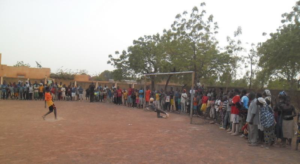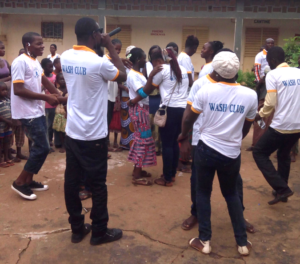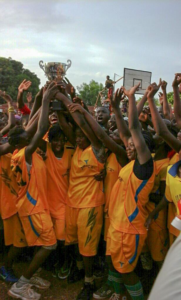October 14, 2016
By Barclay Martin
I never set out to run a handwashing initiative. In fact, this whole project started because I love music, culture and people. What began as a simple idea for a week of art projects bloomed into a completely new story of health and empowerment, which continues to this day. In honor of Global Handwashing Day, I want to share five things I’ve learned that have helped the Wash Project grow beyond my imagination.
I began this journey as part of a medical mission to Mali, West Africa in 2010. My role was simple: lead art and creativity workshops in local schools while teams of doctors and nurses ran life-saving operating rooms and clinics in a week-long sprint to bring healing to a deeply underserved community in the town of Ouelessebougou.
The art projects were engaging, but limited. In search of something more sustainable, I asked for advice. A physician volunteering his time for this mission told me that encouraging the habit of handwashing with soap would drastically reduce the number of clinic patients he’d receive, which, by the end of our week together, was well into the thousands.
It was in that moment that the Wash Project was born. The focus of my mission moved from conducting art workshops to figuring out how to change the very culture of a community.
Without even realizing it, I had assumed the burden of answering these questions of culture, far beyond my reach and knowledge. Through time and experience, the community taught me to understand that it wasn’t my role to answer these questions of how behavior and culture shift. My role was simple: to learn to ask the right questions. It was an insight that changed the way I think so profoundly, I did a TEDx talk about it.
Change won’t happen if those you want to help aren’t interested.
The first year of the Wash Project was full of possibility–a new mission, new learning and over a dozen schools lining up to pilot our fledgling handwashing project.
Through skits, music and dance, we introduced our work to classrooms of kids, whose attention was largely focused on the dance party, despite our best efforts to get them excited about the life-saving power of handwashing with soap.
 The question remained: how do we build upon the healthy habits we’ve just demonstrated to classrooms full of children?
The question remained: how do we build upon the healthy habits we’ve just demonstrated to classrooms full of children?
Tieblecoro, a young translator who served as a volunteer for the Wash Project at the time, saw how the project could take on a life of its own, and did it with one of the planet’s most enduring passions – soccer (football, to the rest of the known world).
He knew that not only would children in the schools want to participate, but adults would come to watch the matches, as well as the children who weren’t able to attend school. At each match, the message of handwashing with soap would be repeated.
Each participating school put together a soccer team, and in its very first year, the Wash Cup brought hundreds of spectators to its sidelines. In the four years since, it has become one of the most beloved events of the year in Ouelessebougou, with tournament-goers now in the thousands, coming to enjoy the spectacle and receive the message for which it was named.
One of the best pieces of advice I have received came from a public health worker in Mali: “If you want to change the culture, nevermind the adults. Young people are the creators of culture. Bring the message to them, and they will carry it home.”
In an effort to encourage the leadership skills in local young people, the Wash Club meets regularly to discuss activities to engage younger people and spread the word about handwashing with soap. This past August, Tieblecoro tasked them with hosting an event, and the entire community was invited. They chose to host a concert (the Wash Concert, of course), and theclub took charge of the details. They learned leadership skills, and brought an event of their own envisioning to their community.
younger people and spread the word about handwashing with soap. This past August, Tieblecoro tasked them with hosting an event, and the entire community was invited. They chose to host a concert (the Wash Concert, of course), and theclub took charge of the details. They learned leadership skills, and brought an event of their own envisioning to their community.
With prosperity came a new problem: how to manage the increasing use of soap?
In this part of Mali, opportunities for many women are limited. Few are given equal access to education or job training, and fewer still have access to their own money within the family structure. Tieblecoro asked a group of local women if they’d like to learn to become entrepreneurs, and though it scared them, several stepped forward.
Under the guidance of a visiting soap maker from the capitol city of Bamako, a women’s soap making cooperative was formed, giving many of the women in it access to their own money for the first time in their lives. The women’s soap making cooperative is now responsible for making all of the soap used by the 18 participating schools, serving over 7,000 students.
 This past April, the girls of Ouelessebougou participated in a public tournament of their own design for the first time.
This past April, the girls of Ouelessebougou participated in a public tournament of their own design for the first time.
They chose basketball, a sport that interested them more than soccer. Teams sprung up, and a tournament was planned. Crowds came in numbers, growing beyond expectations as these courageous girls made history in their town–a place traditionally solimited in its opportunities for them.
This happened because space was created for any girl who wished, to belong. Together, they were able to challenge the conventional culture, and move ever so slightly toward a more equitable world.
When Tieblecoro asked them how they felt about participating in the first basketball tournament for girls, one replied, “It is a way for people to know about our talent and to feel useful in our community.”
In a world whose challenges require the talents of all of us, what is that worth?
Subscribe to our mailing list to receive regular updates from the Global Handwashing Partnership or follow us on social media.
© 2017 The Global Handwashing Partnership (GHP).